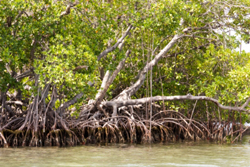Waste-filtering mangroves to the rescue
Domestic sewage is a major threat to sustainability worldwide, and coastal areas near communities in the developing world are particularly vulnerable to this environmental threat. Yet in some natural environments scientists have noticed that mangrove forests were naturally capable of filtering large amounts of untreated sewage in nearby creeks. This phenomenon has led to the formation of the EU-funded project Pumpsea. The project investigated the power of peri-urban mangroves as novel solutions to treating wastewater, beginning with specific areas of east Africa as a test bed. It looked at conservation and replanting of mangroves, as well as using mangrove wetlands to treat domestic wastewater. To achieve its aims, Pumpsea mapped, studied and conducted tests in areas of concern, drawing on many disciplines such as biogeochemistry, ecology and socioeconomics. It documented the microbiological and biogeochemical impact of sewage filtration on the ecosystem and food web, demonstrating strong success rates in treating wastewater. In addition, the project mapped mangroves and mudflat areas near urban regions using remote sensing and ground data to study a specific set of parameters and help propose management strategies. It developed an ecological model that reflects mangrove health and transformed project results into governance guidelines, developing a plan for implementation of the project's proposals. Importantly, Pumpsea deduced that mangrove forests can be a very cost-effective way to treat sewage, a significant find considering that these trees are endemic to all tropical coasts. This green solution has the potential to improve the ecology in east Africa, not to mention many other parts of the world as well. The prospect could be realised through integrated coastal zone management (ICZM) drawing on the project's highly valuable, positive results.







